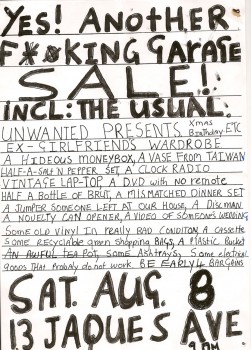Too much adspeak, not enough conversation
In this guest post, Adam Hunt salutes ads that talk to consumers rather than address them in adspeak.
I don’t listen to commercial radio.
The ads are horrible and the continuous sales pitch masquerading as on-air dialogue is insulting to anyone with even half a brain.



ha classic garage sale sign. love it.
Ok, yeah nice ad but it’s not ‘conversation’. A conversation by definition is two-way.
This is just a casual ad.
hi Knotty –
I didn’t mean a conversation by your strict definition.
What I love is that the tone of the ad was speaking to me – not selling to me.
It’s a crucial difference.
And what a dream to be both “client” and “author” in the case of our Garage Sale advertiser here.
When I talk to executives about “speaking the language of our customers” they’re all for it, when they actually see what that means (and it’s not the language they use) they’re less passionate about it.
I hate adspeak, I rebel against it in every way I possibly can. Good article.
I can’t wait for more advertisers (clients and agencies) to embrace this concept (i.e. the language of real people). Planning should champion the cause of consumer insight and being relevant to your target. But it still seems that ads are being made to appease clients not sell to consumers. You don’t have to be literal, but ads really are failing to connect and consumers are not buying it.
When a rare ad that connects does arrive it attracts deserved attention. On a large scale I think that VB does it. Plenty of people recite the ad and believe in the tone of voice. The BBC Knowledge Moonweek promo did it. They both connect.
Likewise, I can’t remember any advertising on commercial radio. It seems to rely on volume (literally!) rather than cut through.
OK, it’s cute. But the David Ogilvy devotees among us would ask:
Did it sell anything? Apart from the book you don’t need.
It’s only the perfect sales pitch if it sold its head off.
PS: “vintage laptop” is the best word clash I’ve seen for years.
PPS: Couldn’t agree more re using language of our everyday.
I agree with what you are saying about commercial radio. I’m glad I don’t work in that industry! Such boring, same-same and un creative advertising. Hard sell ads that make you switch stations.
Hence, I listen to non commerical radio.
For such a cost effective media to produce, I don’t understand why it is so under utilised.
The guy who wrote that garage sale ad, was probably a copy writer!
I agree with Sully about the VB ads connecting.
On at least 5 occasions I’ve overheard non-industry mates talk about which is their favourite “bloke banner”. I applaud any beer ad that moves beyond ingredients & refreshment to making people smile.
I have an answer for Dazza, as I’m a bit of a David Ogilvy fan myself:
“I don’t know the rules of grammar… If you’re trying to persuade people to do something, or buy something, it seems to me you should use their language, the language they use every day, the language in which they think. We try to write in the vernacular.” Having said that, I think Mr Ogilvy would have loved this ad.
Hi Adam, isn’t it a shame that tone is now such a neglected skill. It is hard to think of many brands with a distinctive voice but the ones that do such as Virgin always stand out. The craft and skill of copy needs to come back otherwise how do we distinguish between brands when the products are increasingly the same.
I completely agree Ian.
To me it falls down when people can’t step outside their brands far enough to see things from the public’s perspective.
It all starts with the brief – you need a genuine, human insight. If you have product jargon & adspeak in the brief, it will permeate every step of the production process and end up sounding like 99% of all TV “dialogue” – a recitation of the brief.
Especially if the creative has gone through the ‘science’ of research.
Adam, shouldn’t you be at work….
Ian,
As a copywriter myself, I applaud your comment that ‘the craft and skill of copy needs to come back’.
One great radio ad which I do remember is from several years ago, and it perfectly exemplifies what you wrote, Adam: the Chambers Cellars ad of about 5 years ago.
Roughly, the script went something like this:
‘Hi, this is an ad for Chambers Cellars. They sell alcohol.
If you’re buying alcohol, they’d really love it if you could buy it from them.
And um, if you already buy it from them, then they’d really like it if you could buy some more.
So yeah, thanks, from Chambers Cellars.’
Talk about cut-through, and all because it was the most deliberate avoidance of ad-speak you’re likely to hear, and got straight to the point. I believe it’s called the (under-used) ‘central route to persuasion’.
Anyone know who was responsible for it?
Got any work for me Ian? I’m freelance : )
Adam, you hit it on the nail on the head. Couldn’t agree more.